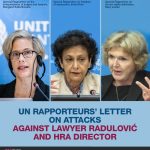
Cetinje Honors Memory and Integrity by Naming a Street After Krsto Đurović
02/05/2025
DOUBLE CELEBRATION FOR THE PLAY “DEATH IN DUBROVNIK” AT THE 35TH MARULIĆ DAYS FESTIVAL IN SPLIT
07/05/2025WITHOUT JUSTICE, THERE IS NO FREEDOM OF THE MEDIA!

Until the murder of Duško Jovanović is solved, the attempted murder of Tufik Softić is clarified, and the wounding and ongoing intimidation of Olivera Lakić are fully addressed, Montenegro will not have ensured all the necessary conditions for media freedom. The United Nations Human Rights Committee also pointed this out to Montenegro in March.
All of these journalists were attacked because of investigative articles they had published or were working on.
It is also necessary to uncover who ordered the attack on writer Jevrem Brković—which resulted in the murder of Srđan Vojičić—who ordered the attacks on journalists Željko Ivanović and Mladen Stojović, and who is responsible for obstructing the prosecution of these cases.
Neither the government of Milojko Spajić nor the governments before it have engaged a foreign expert to analyze the investigation into the 2004 murder of Duško Jovanović, founder and editor-in-chief of the newspaper Dan. This is astonishing, considering that only one “co-perpetrator” of the murder—Damir Mandić, who was in the car from which Jovanović was shot but did not carry out the assassination—has been prosecuted and convicted. The mastermind behind the murder has never been identified, even though it is likely that someone from the top of the then-government was involved. The Commission for Monitoring Investigations of Attacks on Journalists found numerous flaws in the investigation and already in 2018 requested that the government engage such an expert. There has been no information about any progress in this investigation over the past year. Duško Jovanović had published a series of articles in Dan about the organized smuggling of cigarettes, claiming that high-ranking government officials were involved.
In July 2024, an indictment was confirmed against several suspects for membership in a criminal organization, which is also accused of inciting the 2020 attempted murder of Olivera Lakić. However, the background of this attack—as well as previous attacks on her and her family—remains unresolved. The masterminds, who are the most important figures in the case, have not been identified. The statute of limitations has already expired for prosecuting the perpetrator for carrying the weapon used to wound Olivera in 2018, and due to the length of the investigation, the statute of limitations also threatens to expire for prosecuting the perpetrator of the actual shooting. Olivera had written about the illegal production and smuggling of cigarettes and the organized crime surrounding it.
According to the State Prosecutor’s Office, the statute of limitations has not yet expired in the investigation of the 2007 attempted murder of journalist Tufik Softić, but there has also been no progress in that investigation. Softić was among the first to write about organized criminal groups in northern Montenegro, and he was attacked twice because of it—the second time in 2013. Both the Constitutional Court and regular courts have already concluded that the state failed to conduct an effective investigation into the attacks on him.
In November, journalist Ana Raičković from Pobjeda was subjected to verbal and physical assault. Since then, in March, journalist Duška Pejović was verbally attacked, and there was a recent case of stalking involving Gradska Televizija journalist Magdalena Čelanović. These attacks were notably prosecuted and punished efficiently. We expect that final convictions of the perpetrators will help prevent such troubling incidents and contribute to strengthening media freedom.
This year, we also opposed proposed amendments to media laws that would allow full political party control over the councils of RTCG (Public Broadcaster), the Agency for Audiovisual Media Services, and local public broadcasters. A total of 101 civil society organizations supported an initiative sent to all parliamentary groups in the Montenegrin Parliament, expressing strong opposition to such pseudo-reforms.
Controversies surrounding the legality of the appointment of Boris Raonić as Director-General of RTCG marked the previous year. Although the High Court annulled his appointment through final rulings—due to his failure to meet the requirements for the position and conflicts of interest—Raonić was reappointed. This ultimately led to charges of abuse of official position against four members of the RTCG Council who voted for his appointment on June 1, 2023. Raonić still holds the position of RTCG Director.
On a more positive note, the Police Directorate of Montenegro decided in March this year not to initiate a misdemeanor procedure against journalist Brano Mandić. He was accused of allegedly rude and offensive behavior in his criticism of university professor Aleksandar Stamatović, who had made an inappropriate and lascivious, sexist comment to the host of the show he appeared on. In its statement, the police stated that, in their additional analysis of the case, they considered international conventions and standards on freedom of expression, which had been pointed out by nine civil society organizations. This approach by the police is encouraging for media freedom and sets a standard we hope will not be abandoned.
Finally, we commend the exceptional example of professionalism in service of media freedom provided to Montenegro and beyond by journalist Nemanja Živaljević. He publicly announced that he had resigned from Newsmax Balkans television due to the censorship of his interview with Zdravko Krivokapić, the former Prime Minister of Montenegro. Živaljević pointed out that the removal of the part of the interview in which the Patriarch of the Serbian Orthodox Church, Porfirije, was criticized by the editorial board of TV Newsmax Balkans in Belgrade undermined his professional integrity and credibility, which he had built over almost 19 years of working in several of Montenegro’s most important media outlets.
We hope that Živaljević will continue his journalistic career and pursue the truth in the public interest of both Montenegro and neighboring countries.







 English
English